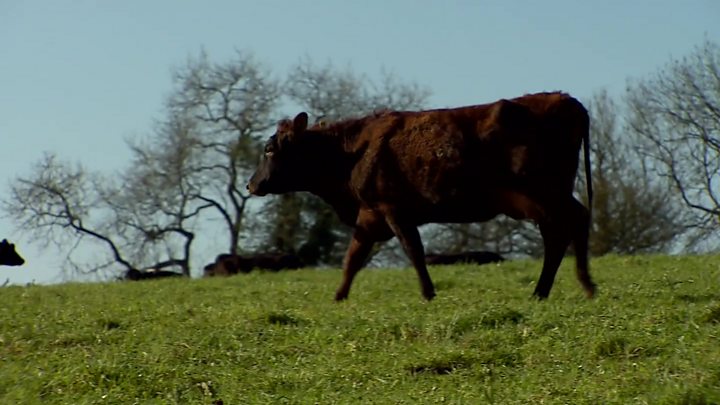Climate change being fuelled by soil damage – report


Media playback is unsupported on your device
Climate change can’t be halted if we carry on degrading the soil, a report will say.
There’s three times more carbon in the soil than in the atmosphere – but that carbon’s being released by deforestation and poor farming.
This is fuelling climate change – and compromising our attempts to feed a growing world population, the authors will say.
Problems include soils being eroded, compacted by machinery, built over, or harmed by over-watering.
Hurting the soil affects the climate in two ways: it compromises the growth of plants taking in carbon from the atmosphere, and it releases soil carbon previously stored by worms taking leaf matter underground.
The warning will come from the awkwardly-named IPBES – the Intergovernmental Science-Policy Platform on Biodiversity and Ecosystem Services – a panel studying the benefits of nature to humans.
The body, which is meeting this week, aims to get all the world’s governments singing from the same sheet about the need to protect natural systems.
IPBES will formally release its report on Monday 6 May.
About 3.2 billion people worldwide are suffering from degraded soils, said IPBES chairman Prof Sir Bob Watson.
“That’s almost half of the world population. There’s no question we are degrading soils all over the world. We are losing from the soil the organic carbon and this undermines agricultural productivity and contributes to climate change. We absolutely have to restore the degraded soil we’ve got.”
Prof Watson previously led the Inter-governmental Panel on Climate Change (IPCC).
“Governments have focused on climate change far more than they have focused on loss of biodiversity or land degradation. All three are equally important to human wellbeing.”
Soil expert Prof Jane Rickson from Cranfield University, UK, added: “The thin layer of soil covering the Earth’s surface represents the difference between survival and extinction for most terrestrial life.
“Only 3% of the planet’s surface is suitable for arable production and 75 billion tonnes of fertile soil is lost to land degradation every year.” She said soils form at a rate of 1cm in 300 years.
There’s uncertainty about the exact level of global soil degradation. But the major hotspots are reported to be in South America, where forests are being felled; sub-Saharan Africa; India and China. Soil scientists in both the biggest Asian nations are worried that their ability to grow their own food may be compromised.
In the US, some soils are being restored as forests take over poor quality land previously worked by small farmers, but others are still being degraded.
The UK is not immune either. Some maize fields in south-west England suffer major soil loss with heavy rainfall because growing maize leaves bare soil exposed. Heavy rain is more likely under climate change. Erosion is also a long-standing issue in the fertile Fens, where, on dry windy days, peaty soil particles sometimes form a kind of smog called the “Fen Blow”.
Peat has a high carbon content – and a recent paper suggests there’s far more carbon being lost from peatlands than previously thought.
And on the chalky hills of southern England, chemical-intensive crop farming is said to have caused the loss of over a foot of soil in some places.
Soils are “incredibly important” for our well-being, said Dr Joanna Clark from Reading University.
“We all know that crops are grown in soil, but soils are important for climate change as well. There’s three times more carbon stored in soil than there is in the atmosphere. So imagine if all that carbon was released, we’d get runaway climate change. So we need to keep the carbon in the soil.”
The simplest way to protect soils while combating climate change is to let forests grow back. This option is favoured by fans of re-wilding.
But some farmers believe they can continue to produce food by changing the way they farm to enhance the soil.
Brexit could give the UK greater flexibility on how to spend public money on farming – enabling much more leeway to reward farmers for capturing carbon in the earth. But there are more than 700 soil types in the UK alone, so it won’t be simple.
Follow Roger on Twitter @rharrabin






